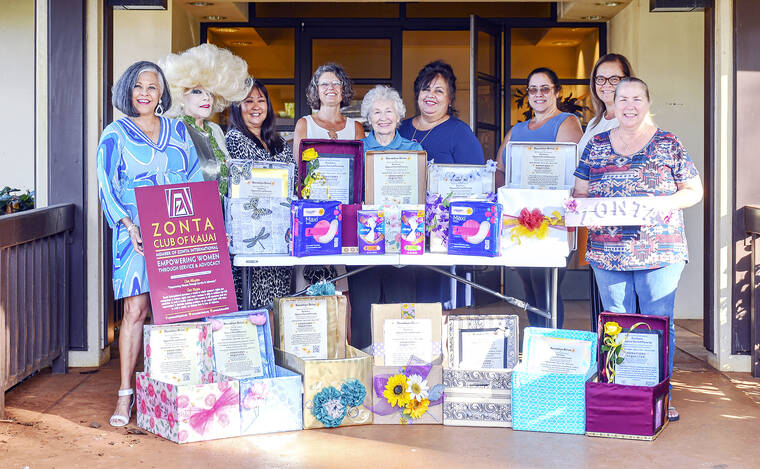LIHU‘E — “This is something that is needed,” said Zonta Club of Kaua‘i member Regina Carvalho.
On Monday, the Zonta Club of Kaua‘i launched its “Zontians Oppose Period Poverty” service project by having its members pick up the specially decorated boxes for donations.
Individuals, businesses and other organizations are asked to donate menstrual-period products at boxes at different locations, including the Kaua‘i Independent Food Bank, Hawai‘i Foodbank Kaua‘i branch, Kaua‘i Economic Opportunity, the YWCA of Kaua‘i, Catholic Charities and the ReStore at Kaua‘i Habitat for Humanity.
The Zonta Club of Kaua‘i is asking for contributions during the month of March, after which the collections will be sorted and packed for distribution to four centers, including the YWCA of Kaua‘i, KEO, Catholic Charities and Wilcox Elementary School health room, for distribution to women, girls and transgender individuals who are in need of menstrual-hygiene sanitary products.
“We never had anything like this when I was younger,” said Laurel Cristobal Andersland, a Zonta member. “We could’ve used a program like this, especially at the schools’ health centers, because we used to have to bring our products to school, and if someone who didn’t have products needed, we had to share ours.”
The Zonta Club of Kaua‘i defines “period poverty” as an inadequate access to menstrual hygiene sanitary products, and suggested items for donation include all individually wrapped regular pads, teen pads, overnight pads, pantiliners, feminine wipes, tampons, menstrual cups and menstrual underwear.
“These items are not cheap anymore,” said Zonta member Marge Akana. “And, with the inflation affecting nearly everything, the prices are not coming down. We need to do similar drives more often.”
Zonta’s Angela Hoover suggested the idea for the Period Poverty campaign after researching the topic on various websites.
Following discussion with the Zonta Club of Kaua‘i, everyone agreed that a campaign to help those with period poverty was a good one based on how people are struggling to get back on their feet in the days following the COVID-19 pandemic.
According to the Alliance for Period Supplies, one in eight women and girls in Hawai‘i between ages 12 and 44 lives below the federal poverty line. Further, one in four teens in the United States has missed class because of the lack of access to period supplies.
In Hawai‘i, 52% of female students in public-school grades seven through 12 attend schools in districts considered low-income.
Overall, there are 288,348 women and girls between the ages of 12 and 44 who live in Hawai‘i.
In addition to collecting materials to help combat period poverty, the Zonta Club of Kaua‘i is also following bills in the state Legislature dealing with period poverty and the sales taxes on period supplies, and how those taxes place an unequal burden on individuals who menstruate.
These bills include House Bill 2249 relating to menstrual equality and companion Senate Bill 2546 that passed its first reading. SB2821, relating to menstrual equality, passed third reading and is headed to the House. Hawai‘i is one of 30 states that tax period supplies.


